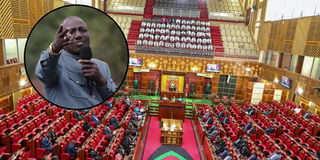Breaking News: Former Lugari MP Cyrus Jirongo dies in a road crash

A past sitting at the National Assembly. By using public pronouncements that border on instructions and thinly veiled threats to the lawmakers, President William Ruto (inset) has had his way in the National Assembly and Senate.
Members of Parliament have been caught up in a big dilemma on whether to support a raft of new tax proposals aimed at helping the cash-strapped government raise more money.
The lawmakers were on Thursday urged to ensure the public support of at least five tax-related Bills that the government intends to pass.
In an informal meeting (Kamukunji) held at Parliament Buildings from 11am, the lawmakers were taken through a 16-page summary of the new taxes, seen by the Nation, that the government plans to introduce.
We held multiple interviews with the MPs, and the picture that came out was that the lawmakers were rallied to support the new proposals and to break down the concepts to their constituents when the time for public participation kicks in.
Also Read: Mr President, your tax policies are punitive
The move, according to the lawmakers, is to avoid backlash and resistance from members of the public as witnessed during the Finance Bill, 2024, that was passed by the House but rejected by President William Ruto after deadly anti-government protests led by the youth.
According to our sources, the executive this time round wants to change tack and ensure that MPs are fully briefed and are in sync before the Bills go for public participation.
The argument is that if MPs support and are made champions of sensitisation initiatives on the new taxes, the Bills are likely to witness less resistance as opposed to leaving communication to the government alone.
“Basically, they are trying to reintroduce the rejected Finance Bill, 2024 through various Bills; and they wanted us to understand them before public participation,” said a second-term ODM lawmaker.
Among the Bills that have been forwarded by the Office of the Attorney-General and National Treasury for consideration by the Finance and Planning committee chaired by Molo MP Kimani Kuria include the Tax Laws (Amendment) Bill, 2024, and the Tax Procedures (Amendment) Bill, 2024.
Others include the Public Finance Management (Amendment) No.3 Bill, 2024, the Public Finance Management (Amendment) No.4 Bill, 2024 and the Financial Institutions Laws (Amendment) Bill, 2024.
“The proposed Bills focus on leveraging only the positive provisions from the Finance Bill, 2024, notably excluding controversial items such as the Motor Vehicle Tax, VAT on bread and the Eco levy,” reads the document that the MPs were taken through.
The document further reads: “The proposals are aimed at revenue collection and improving tax administration. The Bills also introduce reforms to strengthen the regulation of financial institutions, specifically targeting non-deposit-taking microfinance institutions and banks.”
The taxes
Among the new taxes being introduced by the Bills include proposals to expand the digital taxes being imposed to include ride-hailing services, food delivery services, freelance services and professional services.
If passed, those earning in the three categories will be taxed under the digital business income.
The Bills also introduce taxes for non-residents earning through digital business in the country.
The Bills also propose new excise duty imposition on electric transformers, which will attract excise duty of 25 per cent. Imported ink will attract an excise duty of 15 per cent while imported ceramics and washbasins will attract a 35 per cent duty.
Imported float and polished glass will attract excise duty of 35 per cent while imported ceramic flags and pavings will attract an excise duty of 35 per cent.
The new proposals also propose to increase duty on telephone and internet data services to 20 per cent and to increase the Railway Development Levy from the current 1.5 per cent to 2.5 per cent.
Mukurweini MP John Kaguchia said he will oppose the new taxes, noting that more engagement on the proposals should have been done before publication.
“Since this was not done, I would ask the Finance and National Planning Committee to withdraw these proposals from Parliament and only re-table after proper consultations are done,” Mr Kaguchia said.
In particular, Mr Kaguchia questioned the rationale of increasing the railway development levy and imposition of excise duty on electric transformers and parts.
The Financial Institutions Laws (Amendment) Bill, 2024 introduces stricter penalties for credit reference bureaus that breach Central Bank guidelines, setting fines at Sh3 million for corporates and Sh1 million for individuals.
The proposed legislation also mandates a phased increase in banks’ core capital reaching Sh10 billion by 2027.












